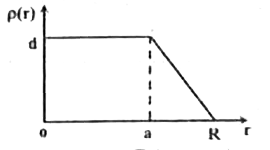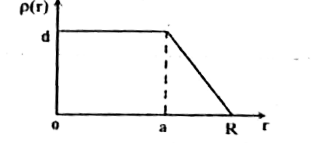
The electric field within the nucleus is generally observed to be linearly dependent on r. This implies.
a=0
a=R2
a=R
a=2R3
The correct Answer is:C
In case of sphere of charge of uniform volume density
E=14πε0.qR3.r or E∝r
Thus, for E to be linearly dependent on r volume charge density should be constant.
or a=R 
Topper's Solved these Questions
- ELECTROSTATICSBook:DC PANDEYChapter:ELECTROSTATICSExercise:Exercise 24.1
Explore 4 Videos
- ELECTROSTATICSBook:DC PANDEYChapter:ELECTROSTATICSExercise:Exercise 24.2
Explore 9 Videos
- ELECTROSTATICSBook:DC PANDEYChapter:ELECTROSTATICSExercise:Example Type 8
Explore 3 Videos
- ELECTROSTATIC POTENTIAL AND CAPACITORSBook:DC PANDEYChapter:ELECTROSTATIC POTENTIAL AND CAPACITORSExercise:(C) Chapter exercises
Explore 50 Videos
- GRAVITATIONBook:DC PANDEYChapter:GRAVITATIONExercise:All Questions
Explore 120 Videos
Similar Questions

The electric field at r= R is
View SolutionFaraday Cage:
A Faraday cage or Faraday shield is an enclosure made of a conducting material. The fields within a conductor cancel out with any external fields, so the electric field within the enclosure is zero. These Faraday cages act as big hollow conductors you can put things in to shield them from electrical fields. Any electrical shocks the cage receives, pass harmlessly around the outside of the cage.

What is the electrical force inside a Faraday cage when it is struck by lightning?
View Solution
Knowledge Check

The electric field within the nucleus is generally observed to be linearly dependent on r. This implies.Aa=0Ba=R2Ca=RDa=2R3Assertion: A current flows in a conductor only when there is an electric field within the conductor:
Reason: The drift velocity of electron in presence of electric field decreases.ABoth (A) and (R) are true and (R) is the correct explanantion of A.BBoth (A) and (R) are true but (R) is not the correct explanation of A.C(A) is true but (R) is falseD(A) is false but (R) is true.Electric field at a point varies as r0 for
AAn electric dipoleBA point chargeCA plane infinite sheet of chargeDA line charge of infinite length
If the total charge enclosed by a surface is zero, does it imply that the electric field everywhere on the surface is zero ? Conversely, if the electric field everywhere on a surface is zero, does it imply that net charge inside is zero.
View SolutionIn the following question a statement of assertion (A) is followed by a statement of reason (R )
A: the potential difference between two concentric spherical shells depends only on the charge of inner shell
R : the electric field in the region in between two shells depedns on the charge of inner shell and electric field is the negative of potential gradient.
View SolutionThe electric field and the potential of an electric dipole vary with distance r as
View SolutionElectric field of a system of charges does not depend on
View SolutionElectric field of a system of charges does not depend on
View Solution